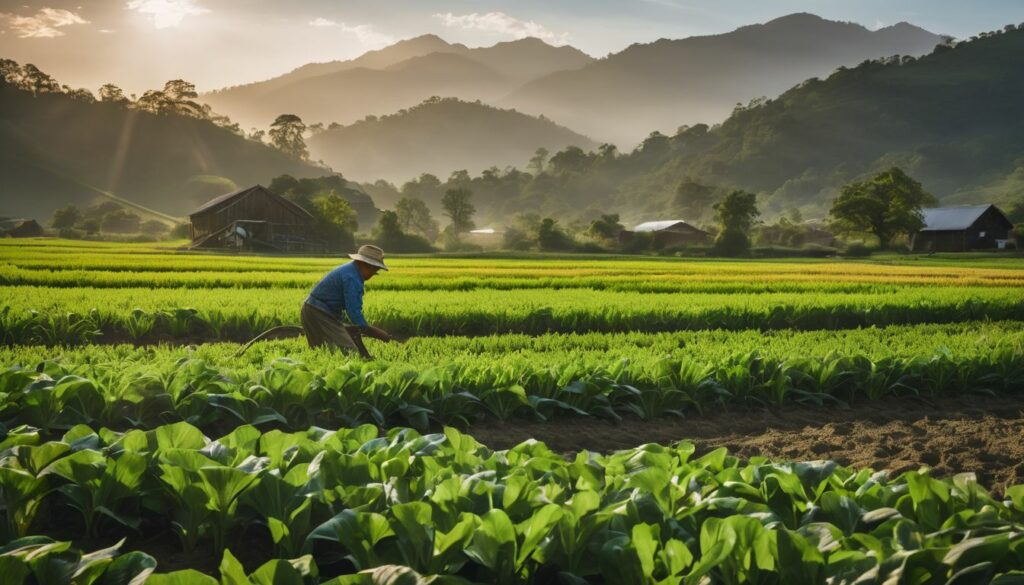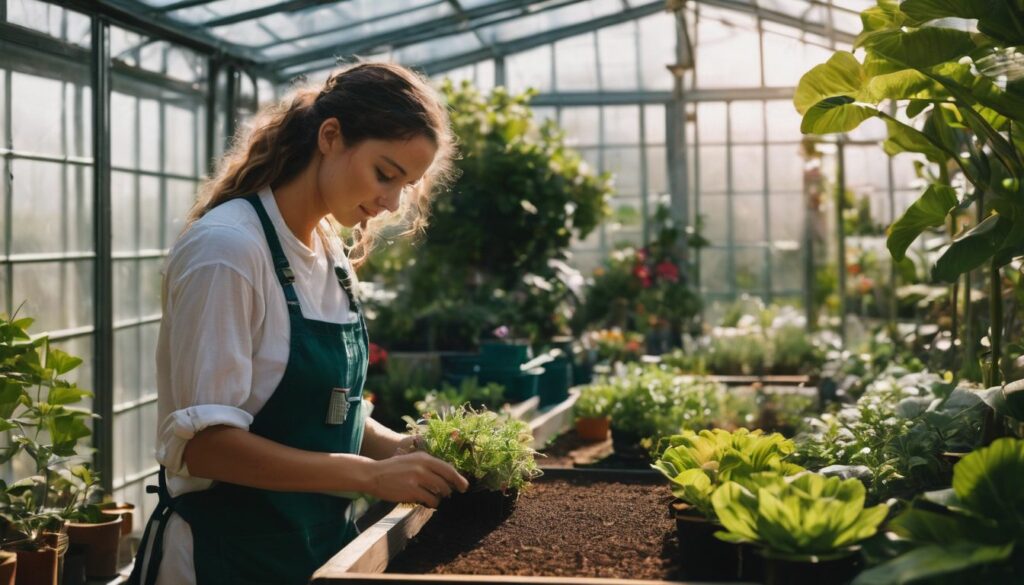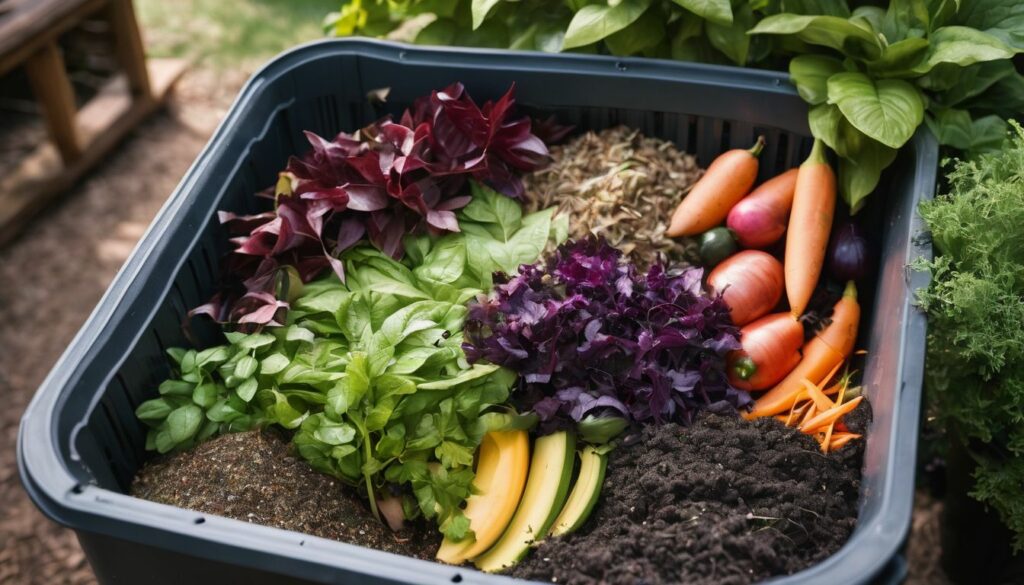As the world’s population keeps growing, we face a big challenge: How do we feed everyone without hurting our planet? You might wonder if that’s even possible. It is, and it all starts with sustainable agriculture.
This way of farming helps us grow enough food for all while taking care of the Earth. Sustainable agriculture makes sure that our kids, and their kids too, will have enough to eat and a healthy environment.
Here’s one thing you should know: sustainable farming doesn’t just help plants grow; it keeps the soil healthy so it can be used over and over again. This blog post will guide you through why this kind of farming is super important for protecting our future.
We’ll look at simple steps farmers are taking to keep nature happy and how these actions help everyone in the long run. Ready to discover how making smart choices today secures tomorrow’s meals? Keep reading!
Key Takeaways
- Sustainable agriculture aims to grow food while taking care of the Earth, ensuring that future generations have enough to eat and a healthy environment.
- Key principles such as soil and nutrient management, efficient use of inputs, consideration of farmer goals and lifestyle choices, rural economic development, water and energy conservation are crucial for sustainable farming practices.
- Women play a significant role in sustainable agriculture by contributing to its success through active involvement in crop production, livestock management, biodiversity preservation, and environmental conservation. Growing your own food promotes self-sufficiency, healthier lifestyles reducing reliance on processed foods while addressing economic challenges for farmers and rural communities.
- International efforts for sustainable agriculture are essential in addressing global challenges related to food security, environmental sustainability, economic stability for farmers.
Definition and Aims of Sustainable Agriculture
Sustainable agriculture is about using farming methods that help keep the land, water, and air healthy. It aims to grow food in ways that can last a long time without harming nature.
Farmers try to use less water and chemicals, improve the dirt where plants grow, and take good care of all living things on their farms. This kind of farming looks after our Earth’s resources so we don’t run out of what we need in the future.
The goals are big: make sure everyone has enough food, protect different kinds of plants and animals, keep farms making money, and make life better for people in farming towns. By doing this, we help make sure kids and grandkids will have a good place to live with fresh air, clean water, and lots of green spaces filled with life.
Next up: learning about key principles like taking care of soil health!
Key Principles and Environmental Factors
Soil and nutrient management is crucial for sustainable agriculture, as it ensures the long-term fertility of the land and reduces reliance on chemical fertilizers. Efficient use of inputs minimizes waste and environmental impact, while consideration of farmer goals and lifestyle choices promotes a balanced approach to farming.
Rural economic development is also a key factor in sustainable agriculture, as it supports local communities and economies. Water and energy conservation play a vital role in reducing the environmental footprint of agricultural practices.
Soil and Nutrient Management
Proper soil and nutrient management are crucial in sustainable agriculture to maintain soil fertility and health. Sustainable farming practices, such as crop rotation and organic agriculture, help in preserving the soil’s nutrients and preventing erosion.
These methods also contribute to climate resilience, food security, and ecologically friendly farming practices by promoting biodiversity and protecting natural habitats.
Soil fertility is vital for successful crop production; therefore, sustainable ways of maintaining it through conservation farming and integrated systems are essential. By emphasizing the use of renewable resources and ecological balance, sustainable agriculture ensures that future generations will have access to fertile soils for productive farming while reducing pollution and conserving water resources.
Efficient Use of Inputs
Efficient use of inputs in sustainable agriculture involves using resources like water, fertilizers, and energy wisely to reduce waste and maximize productivity. This means employing precision farming techniques, such as drip irrigation and controlled-release fertilizers, to minimize resource usage while maintaining or increasing crop yields.
By optimizing input efficiency, sustainable agriculture can promote environmental sustainability by reducing chemical runoff into waterways and minimizing greenhouse gas emissions from energy-intensive agricultural processes.
By focusing on efficient input use, sustainable agriculture aims to ensure that future generations have access to vital natural resources while also promoting economic profitability for farmers.
Consideration of Farmer Goals and Lifestyle Choices
Moving from the efficient use of inputs to the consideration of farmer goals and lifestyle choices, sustainable agriculture takes into account the social responsibilities associated with farming.
It focuses on ensuring that farmers and workers have good working conditions, fair wages, and a desirable living environment. Additionally, it aims to support rural communities by addressing their needs and fostering economic development.
This holistic approach not only benefits the environment but also encompasses the well-being of those involved in agricultural practices.
Sustainable agriculture recognizes that farmers have diverse goals and lifestyles, thus promoting flexibility in farming methods to accommodate these differences. By doing so, it enables farmers to choose sustainable practices that align with their values while contributing positively to environmental health and ecosystem services.
Rural Economic Development
Considering farmer goals and lifestyle choices is important in the context of rural economic development. Sustainable agriculture not only benefits the environment but also plays a significant role in supporting local economies.
By promoting sustainable agricultural practices, such as organic farming and efficient use of resources, rural communities can experience improved income opportunities and strengthened economic stability.
This fosters a cycle of investment in local businesses, infrastructure, and education that further enhances the overall well-being of rural areas.
Rural economic development through sustainable agriculture also creates new job opportunities within the community, particularly for younger generations who are encouraged to embrace farming as a modern and viable career choice.
Water and Energy Conservation
Water and energy conservation are crucial aspects of sustainable agriculture. Sustainable farming practices aim to reduce water usage, utilizing efficient irrigation techniques and rainwater harvesting.
This helps in preserving water resources for future generations. Furthermore, promoting renewable energy sources like solar power reduces reliance on non-renewable energy, contributing to a more sustainable agricultural system.
Implementing these measures not only benefits the environment but also leads to cost savings for farmers, making it an essential component of sustainable agriculture.
Social and Economic Factors
– The role of women in sustainable agriculture and the importance of growing your own food will be discussed.
Role of Women in Sustainable Agriculture
Women play a crucial role in sustainable agriculture, contributing significantly to its success. They are often responsible for the majority of agricultural work in many developing countries, making them key decision-makers in implementing sustainable practices.
In addition to their active involvement in crop production and livestock management, women also play a vital role in preserving plant diversity and maintaining traditional knowledge of local ecosystems.
Their participation is essential for promoting social equity within rural communities and ensuring the long-term sustainability of agricultural practices. Women’s empowerment and involvement in sustainable agriculture not only benefit their families but also contribute to environmental preservation and economic equity.
Sustainable agriculture benefits from the active participation of women who bring valuable insights into resource management, pest control, plant diversity, food security, and biodiversity protection.
Engaging women as equal partners helps address economic challenges by improving household income while enhancing environmental conservation efforts through organic agriculture practices.
Growing Your Own Food
After considering the role of women in sustainable agriculture, it is important to understand the significance of growing your own food. This practice promotes self-sufficiency and provides numerous benefits:
- By growing your own food, you can ensure access to fresh and nutritious produce, contributing to a healthier lifestyle for you and your family. This reduces reliance on processed and potentially harmful foods.
- You have control over the cultivation process, enabling you to avoid harmful chemicals and pesticides commonly used in commercial farming. This supports environmental sustainability and reduces exposure to toxins.
- Growing your own food encourages biodiversity by allowing you to cultivate a variety of crops, promoting ecological balance and reducing dependence on monoculture farming.
- It fosters a deeper connection with nature and an appreciation for the effort required to produce food, instilling valuable life skills and knowledge about sustainable agricultural practices.
- The act of cultivating one’s food contributes to reduced carbon footprint by eliminating the need for transportation and packaging associated with store-bought produce, thereby supporting environmental conservation efforts.
Addressing Economic Challenges
Sustainable agriculture addresses economic challenges by promoting financial stability for farmers and rural communities. It provides opportunities for diversified income streams, such as agro-tourism and value-added products, which can enhance economic resilience.
By minimizing the reliance on expensive synthetic inputs, sustainable agriculture reduces production costs while maintaining or even increasing yields, boosting profitability for farmers.
Additionally, it creates job opportunities in local food systems and supports small-scale producers, contributing to vibrant rural economies. Sustainable agriculture also helps reduce the volatility of markets and increases access to healthy, locally produced food at fair prices.
Policy and Global Initiatives
Countries around the world are implementing policies and initiatives to promote sustainable agriculture. Read on to learn more about how these efforts are shaping the future of farming for generations to come.
International Efforts for Sustainable Agriculture
International efforts for sustainable agriculture are crucial in addressing global challenges related to food security, environmental conservation, and economic development. Organizations such as the Food and Agriculture Organization (FAO) of the United Nations play a pivotal role in promoting sustainable agricultural practices worldwide.
The FAO assists countries in implementing policies and programs focused on soil conservation, water management, biodiversity protection, and climate change adaptation. Moreover, international partnerships like the Global Alliance for Climate-Smart Agriculture work towards integrating sustainable approaches into national agricultural systems, aiming to ensure food security while mitigating climate impact.
Efforts at the international level also include initiatives from developed countries like the United States that promote sustainable farming practices through subsidies and support programs for environmentally friendly agriculture.
Policies in the European Union, United States, and Asia
When examining sustainable agriculture, it’s essential to consider the policies that govern it across different regions. In the European Union, United States, and Asia, various initiatives and regulations have been put in place to promote sustainable practices in agriculture.
| Region | Key Policies and Initiatives |
|---|---|
| European Union (EU) |
|
| United States (US) |
|
| Asia |
|
History of Sustainable Agriculture
Policies in the European Union, United States, and Asia have been influenced by the history of sustainable agriculture. Farming methods used by ancient civilizations like the Mayans and Aztecs focused on sustainability.
In 1940, Sir Albert Howard‘s book “An Agricultural Testament” emphasized natural farming techniques that became foundational to sustainable agriculture principles. The Green Revolution in the 1960s introduced modern agricultural technologies with a focus on high-yielding crops.
Additionally, movements like organic farming in Europe during the 1920s and biodynamic agriculture from Rudolf Steiner have contributed to the development of sustainable practices.
Conclusion
In conclusion, sustainable agriculture is crucial for future generations. By implementing practical and efficient strategies, such as soil management and water conservation, positive impacts can be achieved.
The importance of these approaches cannot be overstated in addressing environmental challenges and ensuring a sustainable future. For further guidance and resources on sustainable agriculture, readers can explore additional materials or services available.
Let’s work together to safeguard the planet’s resources for the well-being of our future generations.
FAQs
1. What is sustainable agriculture?
Sustainable agriculture means farming in ways that are good for the environment, people, and future generations.
2. Why is sustainable agriculture important for future generations?
It’s important because it helps make sure there will be healthy food and a clean earth for kids and their families far into the future.
3. How does sustainable agriculture help the earth?
It helps by using less water, not harming the soil, and cutting down on chemicals that can hurt plants and animals.
4. Can anyone practice sustainable agriculture?
Yes! Anyone who grows food can learn to do it in a way that’s better for everyone now and later on.





